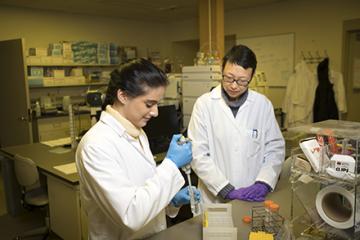Can a Vitamin Improve the Quality of Life for Older Adults?

Rebecca Ruditser, left, and Xueyan Fu, researchers at the Jean Mayer USDA Human Nutrition Research Center on Aging at Tufts University, examine vitamin K from a food sample. (Photo courtesy of Tufts University)
This country is aging; soon there will be more people 65 and older than teenagers. Hand-in-hand with that change comes increasing health care costs, which have risen more than 38% since 2010. Scientists, including those with the Agricultural Research Service (ARS), are helping to improve the quality of life of older Americans and to keep their health care costs in check.
The focus of their research: vitamin K.
“Vitamin K was discovered almost a century ago when it was established that it is essential for blood clotting. Over the years, research has suggested other roles for vitamin K, especially in reducing risk of certain chronic diseases,” said Sarah Booth, center director and senior scientist at the Jean Mayer USDA Human Nutrition Research Center on Aging at Tufts University in Boston, MA.
ARS-funded research at the Jean Mayer Center is looking into how dietary patterns, specific foods, and/or their components may mitigate age-related impairments. One of these components is vitamin K. Specific research goals include determining the effects of vitamins K and D on bone, muscle, joint metabolism, and function in older adults; and the association of vitamins K and D metabolites in the brain and cognitive impairment and neuropathology in older persons.
One of the problems researchers had been trying to solve was how to establish exactly how much vitamin K a person needs. The adequate intake of vitamin K for adults is 90 micrograms/day for women and 120 micrograms/day for men. Booth said the term “adequate” is used when there is not enough experimental evidence to establish the more standard term “recommended dietary allowances.”
In collaboration with the ARS Beltsville Human Nutrition Research Center in Beltsville, MD, which is responsible for a public, online database of nutrition information called FoodData Central, researchers are expanding the food composition database for vitamin K. There are multiple forms of vitamin K in the food supply, and Booth said that people may consume more than previously thought; how that will impact future dietary recommendations for vitamin K is something the scientists are investigating.
“We have no evidence that older adults require more vitamin K than younger adults,” Booth said. “However, based on National Health and Nutrition Examination Survey data, many older adults, especially men, do not consume even the adequate intake for vitamin K. Moreover, vitamin K intake among men has been declining for the last two decades.”
How does one find enough vitamin K to consume? Booth said there is an abundant amount of vitamin K in a healthy diet, but very little in dietary supplements, so people need to consume a healthy diet. There are actually two types of vitamin K and each has its own natural sources. K1, or phylloquinone, is entirely plant-based and found in green leafy vegetables, herbs, and certain plant oils, like soybean and olive oil. Vitamin K2 (menaquinone) is found primarily, but not exclusively, in fermented foods, dairy (especially some cheeses), and some poultry products.
Booth’s research reveals that, in terms of gait and joint health, older adults with low vitamin K intake are more prone to age-related osteoarthritis and poorer gait and knee osteoarthritis. On the other hand, older adults who consume higher amounts of vitamin K show less cognitive decline, including dementia, with aging.
“In my opinion, vitamin K will not cure dementia,” Booth cautioned. “Instead, vitamin K, along with other food components, most likely contributes to the resilience of the brain to deal with factors that can result in pathological brain aging, such as inflammation and oxidative stress. Therefore, intake of a healthy diet throughout one’s life would be ideal – but it’s never too late to start adopting healthy eating habits.
“Moving our understanding of vitamin K and aging forward has been [an ongoing] collaborative process,” Booth said. “It is my feeling that, collectively, these studies will eventually reveal how vitamin K contributes to healthy aging.” – by Scott Elliott, ARS Office of Communications
Also in our series on Staying Healthy Later in Life:

